The COVID-19 pandemic hitting the world in 2020 poses an unprecedented, major challenge to economies and societies around the world. It is severely impacting the private employment services sector which is working hard to weather the crisis and stand ready to accompany recovery. The primary concern of the World Employment Confederation and its members is to protect the health and safety of workers.
The outbreak of the coronavirus (Covid-19) has crippled national economies around the world. The overlapping supply and demand shocks resulting from the various measures adopted by governments to cope with the pandemic impacted the labour market significantly. Record job losses and reduction in GDP growth are recorded, and other indicators like international job mobility and income inequality are also worsening.
The private employment services sector is a strong barometer of the cycles and well-being of economies. Its core service, agency work, has therefore been particularly hit by the Covid-19 crisis. Firstly, because the level of activity of agency work is directly connected to the evolution of GDP. Secondly, because agency work is a highly intensive labour service, employing millions of workers across the globe. In some countries, the Covid-19 crisis has cut down the number of agency workers by 50% to 70%.
To get an overview of the impact of the Covid-19 pandemic on the agency work markets across the world, have a look at WEC’s analysis. WEC members can access more detailed data as well as assessments / forecasts from international organisations via the Members Area. Other resources, such as an inventory of industry-specific policy issues and developments related to Covid-19 are also available for Members-only.
As the world is moving from immediate response and resilience measures to the various stages of recovery, it is essential that the private employment services sector remains able to offer its labour market expertise. Especially temporary agency work will be among the first sectors to bring workers back into quality employment, using its experience in managing labour market fluctuations. This contribution can facilitate the pathway back to work and ensure an inclusive economic and social recovery.
The World Employment Confederation is in dialogue with global and European policymakers to ensure that the appropriate regulatory framework is put in place to develop a quick and safe road to recovery and to allow the private employment services sector to fully play its role. Three areas of focus and a set of priorities have been identified by the World Employment Confederation’s members:
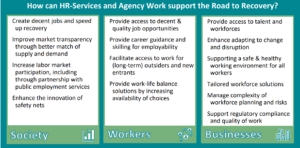
For more information about how the private employment services sector will support society, workers and business on the road to recovery, check WEC’s policy paper. For specific recommendations targeted to the European context, read WEC-Europe’s position paper.
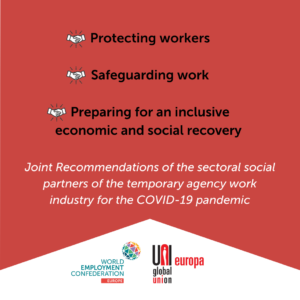
At European level, the World Employment Confederation-Europe adopted a series of joint recommendations with UNI-Europa, the trade union representing agency workers, to both mitigate the immediate impact of the crisis and prepare for the recovery of the labour market and the economy.
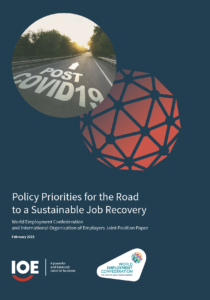
In February 2021, WEC and the International Organisation of Employers (IOE) put out a series of policy recommendations which set a clear and concrete path for a sustainable recovery of employment and decent work.
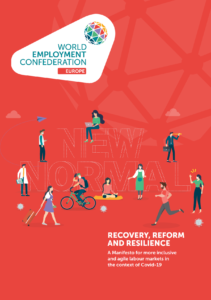
As Europe slowly starts to recover from the crisis, the private employment services industry wants to take the opportunity to look beyond and to use this moment to make labour markets more agile and inclusive. In a Manifesto released in June 2021, the World Employment Confederation-Europe puts forward concrete recommendations on how the private employment services sector can contribute to recovery, reform and resilience after the Covid-19 crisis; and on what policies are needed at EU and national levels to make labour markets more agile and inclusive.
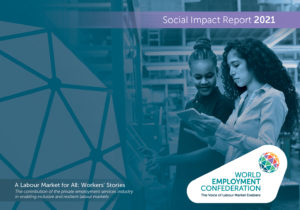
In its Social Impact Report 2021, the World Employment Confederation demonstrates through workers’ stories and data how the private employment services sector across the world contributes to building more resilient and inclusive labour markets and takes its role in driving social innovation and social purpose a step further in the context of the Covid-19 pandemic.
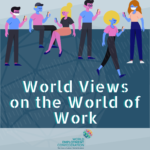
To reflect on the changes brought to the world of work by the Covid-19 crisis and fuel the debate on what the New Normal will look like, the World Employment Confederation is having a ‘big conversation’ with employment experts and national recruitment federations from around the world.
Find out about their insights on the post-Covid world of work through our blog “Notes on the New Normal” and our podcast “World Views on the World of Work”. Follow us on social media and don’t hesitate to share your insights! #NewNormal